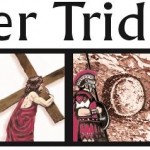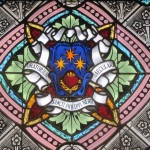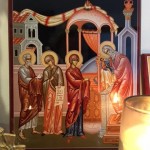Part of what makes Patheos so interesting is this: it’s a place where you can find a progressive female Christian minister write so exquisitely about a Lutheran Advent Vespers as to make a Catholic’s soul lurch in holy envy:
In those soft evenings, the quiet of late December surrounded me – but my life itself was loud. I did not know how much I needed to settle for 45 minutes into song and silence and hear someone sing about the angel Gabriel and Mary. The first time I heard, “you have cast the mighty down from their thrones and uplifted the humble of heart…you have filled the hungry with wondrous things and left the wealthy no part” I thought that it was the most radical and beautiful thing I had ever heard. I did not know that it was lifted straight from Luke’s gospel, and not just some Leftist songbook, and I cried the first time I sang it. At the time, I was employed to cook meals for folks with HIV. We had a lovely little cottage called the Acorn Center where HIV positive men and women could come and be with their fellows and eat a warm meal. . .and on Wednesday evenings I’d sing of a God who fills the hungry and uplifts the humble, and singing that made the rest of my week make more sense. I’d soon learn that people all over the world were singing this song of Mary’s and that the Magnificat has always been sung at Vespers, and that when I sang it that Advent, I sang it with all who had come before, all the monks and nuns and faithful of every age, as well as all who gathered, as I was doing, to pray in the Winter of 1996.
It’s a lovely piece, difficult to excerpt, so I encourage you to go read it all.
Her last line gives a perfect set-down to the tiresome question, “Mary Did You Know?”
It makes me feel a little woebegone that Nadia Bolz-Weber found a connection with the Vespers-praying monastic men and women who had gone before her (and continue in prayer, still) in a Protestant church, but on the other hand, I am not surprised. This past Sunday — the First Sunday of Advent — there was no O Come O Come Emmanuel at our Parish. That plaintive chant, with its ancient and mysterious cadences, so evocative of the be-longing of the season, were ignored as the “youth choir” encouraged us to sing an Evangelical “praise song” that no one knew, (or likely wanted), and thus it was not possible for any of us to harken back, or to make the sort of connection written of, here.
We only get to sing these songs, and give ourselves over to this sense of wandering wonder, for such a short time; if our younger people are not exposed to this now, when will they be?
Do the sorts of liturgical Vespers described by Bolz-Weber even exist for most Catholics, except (perhaps) on the campuses of Catholic universities? Do you have them, where you live? Here on Long Island, there are none. For a long time I’ve resented that fact, and wished it were otherwise. I’ve wondered whether I should, perhaps try to push for it, find a way to force the issue, organize it myself. The idea of being warmed and nurtured amid the evensong of a small community of believers — even in our ugly churches — is too inviting.
We Catholics have been depriving ourselves of the succor and consolation of liturgical beauty for too long. We need this sort of thing, and badly. People need to be able to go to our churches and find and absorb what Bolz-Weber found in a small, candle-lit Lutheran church in Advent. For her, it changed everything.
How many of us feel the need for it? I know I do.
More cross-channel interest in Advent: Patheos has this year begun a virtual Advent Calendar that you might like to check out. It is, of course, not exclusively Catholic (although we are writing our share on Advent), so that might push some comfort zones, but Christ prayed that “all may be one”; Advent is a good time to push oneself to hear other voices; that’s how we can shake ourselves, sometimes, from a stagnant place and into something deeper. Maybe our Protestant brothers and sisters can help us out!
UPDATE:
Fr. Dwight has more evidence of our loss of beauty, and efforts to correct that.











